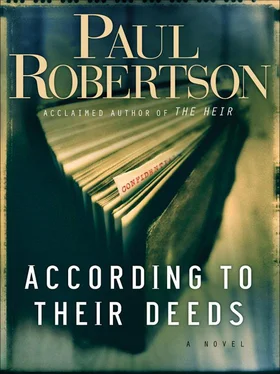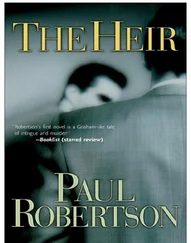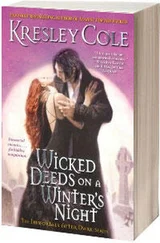Paul Robertson - According to Their Deeds
Здесь есть возможность читать онлайн «Paul Robertson - According to Their Deeds» весь текст электронной книги совершенно бесплатно (целиком полную версию без сокращений). В некоторых случаях можно слушать аудио, скачать через торрент в формате fb2 и присутствует краткое содержание. Жанр: Криминальный детектив, на английском языке. Описание произведения, (предисловие) а так же отзывы посетителей доступны на портале библиотеки ЛибКат.
- Название:According to Their Deeds
- Автор:
- Жанр:
- Год:неизвестен
- ISBN:нет данных
- Рейтинг книги:4 / 5. Голосов: 1
-
Избранное:Добавить в избранное
- Отзывы:
-
Ваша оценка:
- 80
- 1
- 2
- 3
- 4
- 5
According to Their Deeds: краткое содержание, описание и аннотация
Предлагаем к чтению аннотацию, описание, краткое содержание или предисловие (зависит от того, что написал сам автор книги «According to Their Deeds»). Если вы не нашли необходимую информацию о книге — напишите в комментариях, мы постараемся отыскать её.
According to Their Deeds — читать онлайн бесплатно полную книгу (весь текст) целиком
Ниже представлен текст книги, разбитый по страницам. Система сохранения места последней прочитанной страницы, позволяет с удобством читать онлайн бесплатно книгу «According to Their Deeds», без необходимости каждый раз заново искать на чём Вы остановились. Поставьте закладку, и сможете в любой момент перейти на страницу, на которой закончили чтение.
Интервал:
Закладка:
“I wonder what Derek would have thought,” Charles said.
Norman pointed at the next catalog page. “I bet that’s the lot you’re after.”
“Yes.”
“Number sixty-four. You got here just in time.”
“Going once, twice, sold. Lot sixty-two for five thousand six hundred dollars. Next will be lot sixty-three, two Windsor chairs. Bidding will open at five thousand. Do I see five thousand?”
“Those are nice,” Norman said. “I don’t do furniture, but those are nice. From Vermont, 1920, all handmade. The real things. It must have taken a long time to pull all this stuff together.”
“A lifetime.”
“And poof, here it’s all gone in three hours. Kind of funny, you know?”
The auctioneer’s voice stabbed the air, slicing and cutting, on and on, relentlessly.
“And his wife doesn’t want it.” Norman said. “It’s her selling it off, right?”
“I believe so.”
“She’s making a bundle. Especially after that desk! I wonder if she knew he was worth so much? His stuff, anyway. Did you get the list?”
“The catalog?” Charles asked, with it in his hand. “This?”
“No, the list from the police.”
“I don’t know of any list from the police.”
“It’s the stuff that got stolen, you know, that night he got killed.”
“Any other bid? Going once, twice, sold. Lot sixty-three for thirteen thousand dollars.”
“They want dealers to be looking for it,” Norman said.
“No, I didn’t get that list.”
“Next will be lot sixty-four, a set of thirteen antique books. Bidding will open at ten thousand. Do I see ten thousand?”
“This is you, right?”
Charles nodded.
“Good luck,” Norman said.
“Thanks.”
“I guess no books got stolen.”
“Ten thousand, thank you. Do I see eleven?”
Norman kept talking. “So that’s why they didn’t give you the list. Police and FBI, too. They’re all looking.”
Charles had his own paddle in his lap. He watched the bids increase.
“How much will it go for?” Norman said.
“Twenty-three, twenty-four for the set, maybe twenty-five.”
“Remember, it’s all going high. You sold them all to him in the first place?”
“Fifteen thousand. Do I see sixteen? Thank you, sixteen thousand.”
“Yes. A book at a time, over the last six years.”
Charles leaned forward, watching the different bidders.
“Do you know everyone bidding?” Norman said.
“So far.”
“From around here?”
“No. Briary Roberts in New York. Jacob Leatherman himself from San Francisco.”
“The old guy?”
“Yes.”
“Did you know he was coming?”
“We had dinner last night.”
His eyes were on the contest. The other bidders took turns, pushing the price up.
“Twenty thousand. Do I see twenty-one?”
Charles lifted his paddle. Now he was joined in the battle himself.
“Twenty-one thousand.” For a moment, he owned the bid. “Do I see twenty-two?” And then he did not. “Twenty-two, thank you. Do I see twenty-three?”
Suddenly the bidding intensified with quick jabs from Jacob Leather-man, and then New York again.
“Twenty-five? Thank you. Do I see twenty-six?”
Jacob Leatherman’s paddle quivered in the air.
“Twenty-six. Do I see twenty-seven?”
Charles signaled, quickly.
“Twenty-seven thousand. Do I see twenty-eight?”
Jacob was frowning from across the room, but his paddle was on the floor.
“Any other bid? The bid is twenty-seven thousand. Going once, twice, sold. Lot sixty-four sold for twenty-seven thousand dollars.”
“But I thought you said it was only worth twenty-four,” Norman said.
“Sentiment.”
“Next will be lot sixty-five, a wood inlay chess set. Bidding will open at two thousand dollars.”
“I don’t do books,” Norman said, “so what do I know. Oh, I sold this chess set. I’m just trying to get back what I sold him.”
Charles stood and took a deep breath and moved toward the door.
Charles stepped out from the building into very bright sunlight.
It took a moment to adjust.
Traffic was heavy. On the sidewalk, a dozen people were scattered over the length of the block. The gray stone and mirrored windows of the office building across the street were very bright.
A cardboard box was in front of him, tight in both hands.
He turned south toward Pennsylvania Avenue, three blocks away. The faces he passed were stern and silent against the world, or talking on cell phones, alive, animated, in other worlds. Charles stopped at the first corner.
He was being followed.
Across the street a young man had stayed even with him. He was in torn jeans and a hooded sweatshirt, and he had stopped on his opposite corner. A well-dressed woman, passing him, instinctively drew back, and hurried past.
Charles waited.
Abruptly the man sprang from the curb and sprinted, dodging cars. His eyes were on the box in Charles’s hands. A car squealed but the young man, lithe and quick, was already across.
Charles waited. The predator came to a halt, inches away.
“Hey, boss,” he said, in a low voice.
“Don’t cause a wreck, Angelo.”
He shrugged. “You got that?”
“Twenty-seven thousand.”
“For a little box.” His accent was urban Hispanic and so were his black hair and shadowy face.
“You take it,” Charles said.
“Back to the shop?”
Charles handed him the box.
“Take it to the shop. I’ll be right there.”
“Okay, boss, I’ll take it, it’s not any problem.”
“Be careful.”
“You are worrying for me, boss, or you are worrying for that box?”
“The box isn’t going to do anything foolish.”
Angelo smiled, a tiger showing its teeth. “I am smarter than that little box.”
“Try to be.”
With no other words he turned away, only walking but very quickly. Charles continued on his own way to a Metro station, and descended into the ground.
“King Street. Next stop Eisenhower Avenue.” The doors whirred and Charles was on the platform, looking out at the streets of Alexandria. The escalator took him down to them.
The pocket around the station was in giant twelve-story scale, of offices and plazas, tied to the rest of the city only by it being brick. Beyond, though, a few blocks of King Street brought Charles to the three-story scale of real west Alexandria, authentic and shabby from a century of pawn and secondhand existence, now getting better but still not good.
Then another five blocks east and the buildings were solid and many were very good, and rents were high and the shop windows cleaner and the doors were appealing instead of simply peeling.
Charles crossed noisy Washington Street and into the heart of crowds and crowds. At Market Square he turned right into quiet streets, then one more block, and finally up two steps, and into a place that was very, very quiet.
The first impression was always the quiet. It was the special calm silence of books aging, books that were very practiced at aging.
“Hello, Alice.”
“Good afternoon, Mr. Beale.” Alice had a way of speaking that did not disturb the silence. “Mrs. Beale was just asking if I’d seen you.”
The second impression was the quiet of color. Only the part of any color that could last decades was left in the room. Even loud colors were quiet.
“Is she upstairs?” he asked.
“Yes, sir.”
Then the smell, which was faintest, half like a forest and half like old linen, but sharp.
“And have you seen Angelo?” he asked.
“No, sir.” Her dress was the russet of a bright red cover faded over forty years.
“I didn’t think he’d be back yet.” The counter stretched across the right side of the room and stairs went up the left side, and a rail ran across the back.
Читать дальшеИнтервал:
Закладка:
Похожие книги на «According to Their Deeds»
Представляем Вашему вниманию похожие книги на «According to Their Deeds» списком для выбора. Мы отобрали схожую по названию и смыслу литературу в надежде предоставить читателям больше вариантов отыскать новые, интересные, ещё непрочитанные произведения.
Обсуждение, отзывы о книге «According to Their Deeds» и просто собственные мнения читателей. Оставьте ваши комментарии, напишите, что Вы думаете о произведении, его смысле или главных героях. Укажите что конкретно понравилось, а что нет, и почему Вы так считаете.











